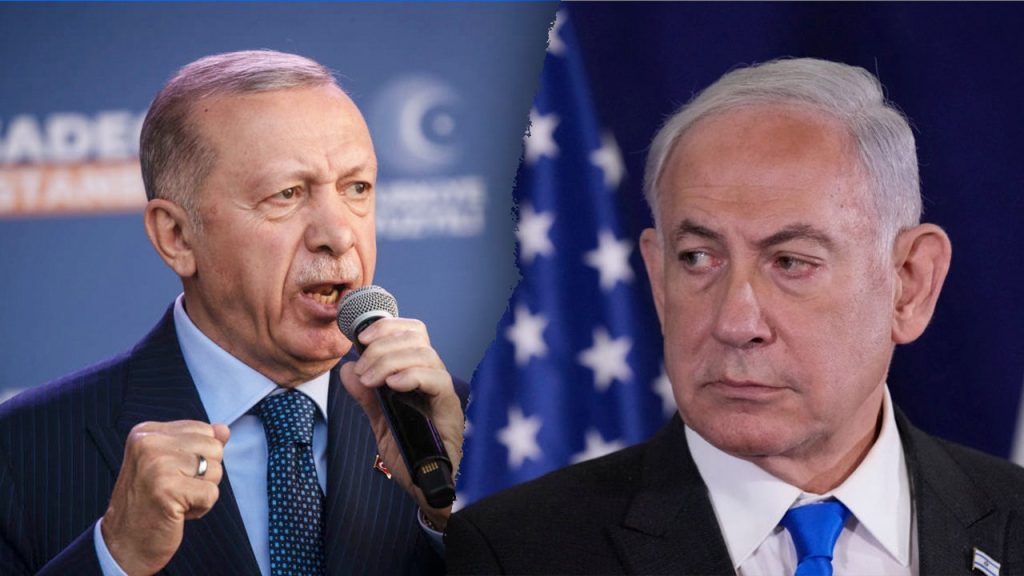The escalating tensions between Israel and Turkey have reached a fever pitch following Ankara’s condemnation of Israeli military actions in Syria and Turkey’s intensified operations within the war-torn country. This discord centers around the disputed Golan Heights, a strategic territory that Israel claims as a vital security buffer, while Turkey criticizes Israel’s presence there as an occupation. The disagreement over the Golan Heights serves as a microcosm of the broader geopolitical friction between the two nations, with their contrasting stances on the Syrian civil war, the Kurdish question, and the Palestinian issue further exacerbating the divide. This current escalation threatens regional stability and raises concerns about the future of U.S.-backed Kurdish forces battling ISIS, caught in the crossfire of these competing regional powers.
The recent exchange of accusations began with Turkey criticizing Israel’s settlement expansion in the Golan Heights, urging adherence to the 1974 Disengagement Agreement. Israel, however, asserts the agreement is void due to the Syrian regime’s abandonment of its positions during the civil war. Israel emphasizes the Golan’s strategic importance as a defense against Iran and Hezbollah, both active in Syria. Israel retorted by accusing Turkey of hypocrisy, highlighting Turkey’s own extensive military presence and influence in northern Syria, accusing them of supporting jihadist groups and suppressing Kurdish populations. This verbal sparring underscores the deep-seated mistrust and the rapidly deteriorating relationship between the two countries.
This acrimonious exchange signifies a nadir in Israeli-Turkish relations, marking the lowest point in decades. Turkey’s recent imposition of a complete trade ban on Israel is unprecedented for countries maintaining diplomatic ties, further solidifying the breakdown in bilateral relations. President Erdoğan’s rhetoric, including support for Hamas and accusations of Israeli “genocide” in Gaza, has only fueled the flames. Erdoğan’s allusions to potential military action against Israel, mirroring Turkey’s interventions in other conflicts, have heightened anxieties in Israel. His calls for a united Islamic front against Israel, portraying it as a threat to regional and global peace, further contribute to the hostile atmosphere.
Turkey’s expanding military footprint in northern Syria raises significant concerns for Israel. Ankara’s growing ambitions, coupled with its support for anti-Assad rebels, position Turkey as a potential power broker in shaping the future of Syria. This influence directly challenges Israel’s security interests in the region. Turkey’s reliance on financial backing from Qatar and other Gulf states to maintain its influence and rebuild Syria adds another layer of complexity to the geopolitical landscape. This financial dependence on other actors further entangles the Syrian conflict within a web of regional rivalries and alliances, making a peaceful resolution even more elusive.
Turkey’s primary objective in Syria remains dismantling Kurdish control in the north, particularly around the strategically significant city of Kobani. This goal mirrors Turkey’s 2019 incursion, which led to the displacement of hundreds of thousands of civilians. The Kurdish-controlled prisons holding thousands of ISIS fighters are a critical concern for the U.S., Israel, and the West. Any weakening of Kurdish control poses a significant risk of ISIS resurgence and further regional destabilization. The potential for unintended consequences arising from Turkey’s actions is a major source of regional and international anxiety.
As Turkey’s presence in Syria intensifies, the risk of clashes with Israel escalates. Experts draw parallels between Turkey’s interventions in Libya and Azerbaijan, warning that proximity between Turkish forces and Israeli operations or allies could lead to unintended confrontations. Despite the heated rhetoric and mounting tensions, both countries share an interest in avoiding direct conflict. Israel’s focus remains primarily on southern Syria, while Turkey concentrates on the north. The establishment of deconfliction channels with Russia in Syria serves as a potential model for managing the risks of unintended clashes. However, the volatile nature of the region and the deep-seated animosity between the two countries underscore the fragility of the situation, warranting close attention and careful management to prevent further escalation.

